The sacraments are efficacious signs of grace, instituted by Christ and entrusted to the Church, by which divine life is dispensed to us (CCC 1131). Celebrated worthily in faith, the sacraments confer the grace that they signify. They are efficacious because in them Christ himself is at work: it is he who baptises, he who acts in his sacraments in order to communicate the grace that each sacrament signifies (CCC 1127).
A sacrament is often defined as “an outward sign of an inward grace”. This is because each of the sacraments rests upon an outward material sign that was designated by Christ as a way to gain an outpouring of God’s own divine life.
The Sacraments of Initiation
The Sacraments of Initiation

The Sacrament of Baptism
Baptism is the way out of the kingdom of death into life, the gateway to the Church, and the beginning of a lasting communion with God.
Baptism is the foundational Sacrament and the prerequisite for all other sacraments. It unites us with Jesus Christ, incorporates us into his redemptive death on the Cross, thereby freeing us from the power of Original Sin and all personal sins, and causes us to rise with him to a life without end. Since Baptism is a covenant with God, the individual must say ‘Yes’ to it. In the baptism of children, the parents confess the faith on behalf of the children.
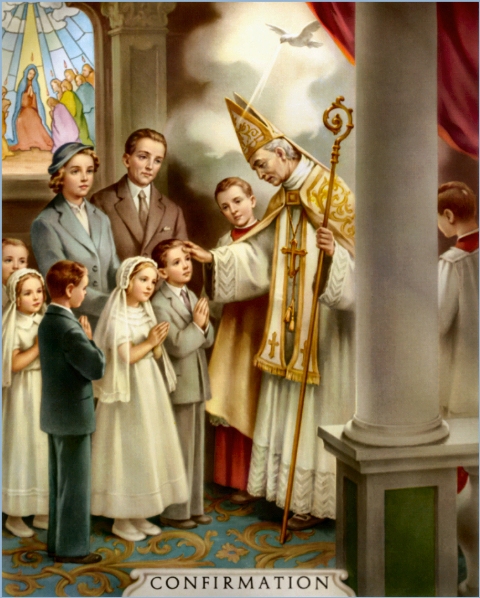
The Sacrament of Confirmation
Confirmation is the Sacrament that completes Baptism; in it the gift of the Holy Spirit is bestowed upon us. Anyone who freely decides to live a life as God’s child and asks for God’s Spirit under the signs of the imposition of hands and anointing with Chrism receives the strength to witness to God’s love and might in word and deed. He is now a full-fledged, responsible member of the Catholic Church.
When a coach sends a soccer player onto the playing field, he puts his hand on his shoulder and gives him final instruction. We can understand Confirmation in a similar way. A hand is placed upon us. We step out onto the field of life. Through the Holy Spirit we know what we have to do and we have been given the power to do it. He has motivated us. His mission resounds in our ears. We sense his help. We will not betray his trust or disappoint him; we will win the game for him. We just have to want to do it and listen to him.
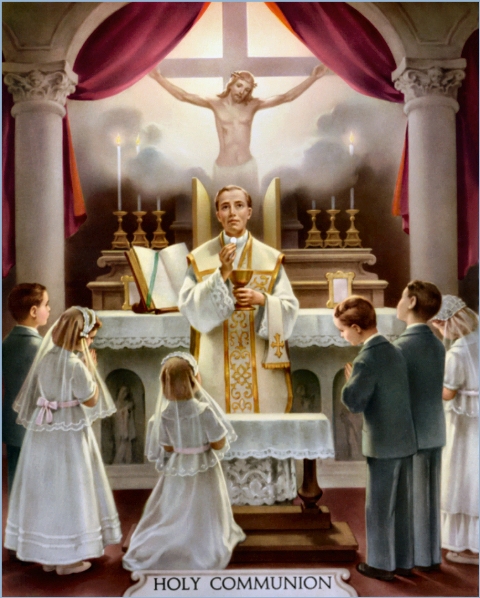
The Sacrament of the Eucharist
Holy Eucharist is the Sacrament in which Jesus Christ gives his Body and Blood – himself – for us, so that we too might give ourselves to him in love and be united with him in Holy Communion. In this way we are joined with the one Body of Christ, the Church.
After Baptism and confirmation, the Eucharist is the third sacrament of initiation of the Catholic Church. The Eucharist is the mysterious center of all these sacraments, because the historic sacrifice of Jesus on the Cross is made present during the words of consecration in a hidden, unbloody manner. Thus the celebration of the Eucharist is “the source and summit of the Christian life” (Second Vatican Council, Lumen gentium [LG], 11). Everything aims at this; besides this there is nothing greater that one could attain. When we eat the broken Bread, we unite ourselves with the love of Jesus, who gave his body for us on the wood of the Cross; when we drink from the chalice, we unite ourselves with him who even poured out his blood out of love for us. We did not invent this ritual. Jesus himself celebrated the Last Supper with his disciples and therein anticipated his death; he gave himself to his disciples under the signs of bread and wine and commanded them from then on, even after his death, to celebrate the Eucharist. “Do this in remembrance of me” (1 Cor 11:24). 126,193, 217.
The Sacraments of Healing
The Sacraments of Healing
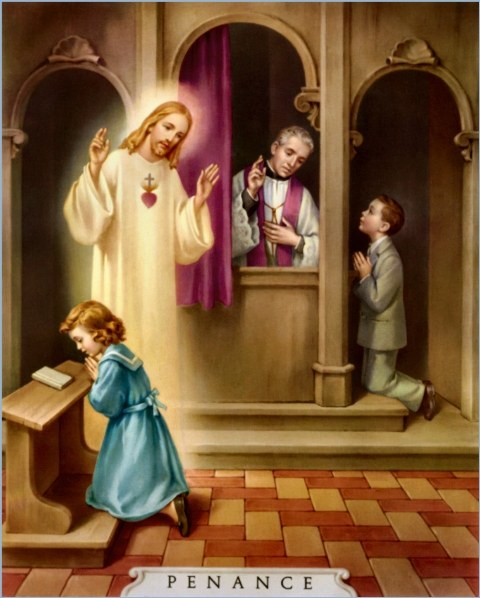
The Sacrament of Penance & Reconciliation
The sacrament of Penance is also called the Sacrament of Reconciliation, of forgiveness, of conversion, or of confession. Jesus himself instituted the sacrament of Penance when he showed himself to his apostles on Easter day and commanded them, “Receive the Holy Spirit. If you forgive the sins of any, they are forgiven; if you retain the sins of any, they are retained” (Jn 20:22a – 23).
Nowhere did Jesus express more beautifully what happens in the sacrament of Penance than in the parable of the Prodigal Son: We go astray, we are lost and can no longer cope. Yet our Father waits for us with great, indeed, infinite longing; he forgives us when we come back; he takes us in again, forgives our sins. Jesus himself forgave the sins of many individuals; it was more important to him than working miracles. He regarded this as the great sign of the dawning of the kingdom of God, in which all wounds are healed and all tears are wiped away. Jesus forgave sins in the power of the Holy Spirit, and he handed the power on to his Apostles. We fall into the arms of our heavenly Father when we go to a Priest and confess. 314,524
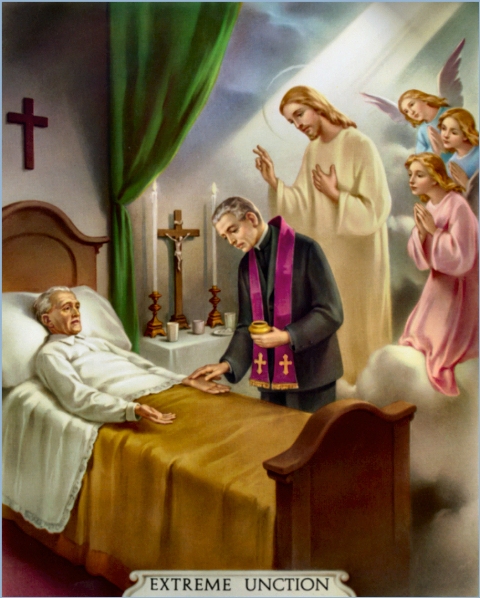
The Sacraments of the Anointing of the Sick
Jesus came in order to show God’s love. He often did this in places where we feel especially threatened: in the weakening of our life through sickness. God wants us to become well in body and soul and, therefore, to believe and to acknowledge the coming of God’s kingdom.
Sometimes a person has to become sick in order to recognise what we all – healthy or sick – need more than anything else: God. We have no life except in him. That is why sick people and sinners can have a special instinct for the essential things. Already in the New Testament it was precisely the sick people who sought the presence of Jesus: they tried “to touch him, for power came forth from him and healed them all” (Lk 6:19). The Sacrament of the Anointing of the Sick can be received by any Catholic whose health is in a critical state.
The Sacraments of Communion and Mission
The Sacraments of Communion and Mission
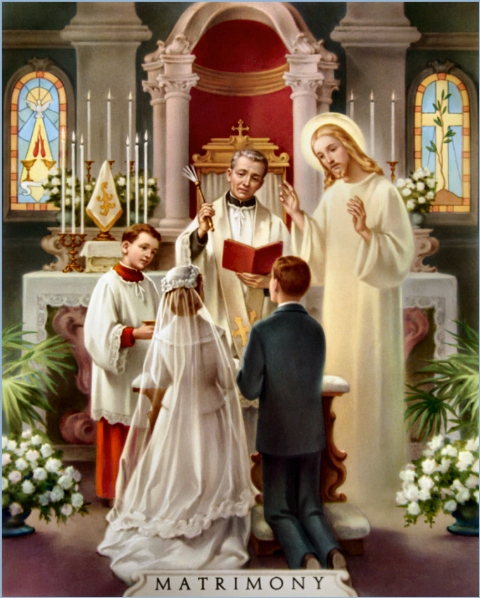
The Sacrament of Marriage
The Sacrament of Matrimony comes about through a promise made by a man and a woman before God and the Church, which is accepted and confirmed by God and consummated by the bodily union of the couple. Because God himself forms the bond of sacramental marriage, it is binding until the death of one of the partners.
The man and the woman mutually administer the sacrament of Matrimony. The Priest or the Deacon calls down God’s Blessings on the couple and furthermore, witnesses that the marriage comes about under the right circumstances and that the promise is comprehensive and is made publicly. A marriage can come about only if there is marital consent, that is, if the man and the woman enter marriage of their own free will, without fear or coercion, and if they are not prevented from marrying by other natural or ecclesiastical ties (for example, an existing marriage, a vow of celibacy).
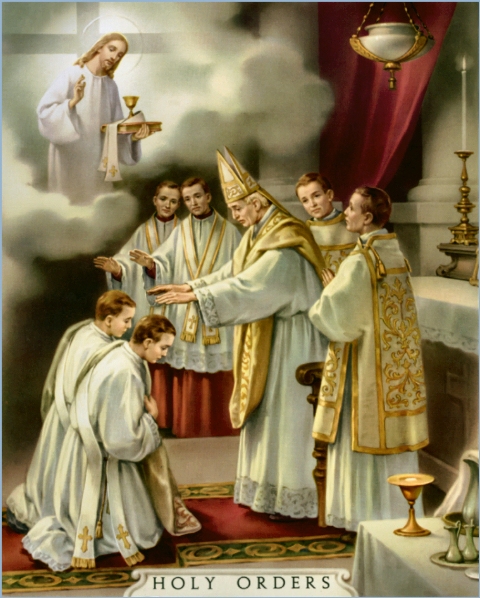
The Sacrament of Holy Orders
The man who is ordained receives a gift of the Holy Spirit that gives him a sacred authority that is conferred upon him by Christ through the bishop. Being a Priest does not mean just assuming an office or a ministry. Through Holy Orders a priest receives as a gift a definite power and a mission for his brothers and sisters in faith. The sacrament of Holy Orders has three degrees: Bishop (episcopate), Priest (presbyterate), Deacon (diaconate).






